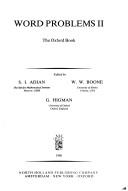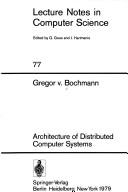| Listing 1 - 3 of 3 |
Sort by
|
Book
ISBN: 0201040697 9780201040692 Year: 1979 Publisher: Reading (Mass.) : Addison-Wesley,
Abstract | Keywords | Export | Availability | Bookmark
 Loading...
Loading...Choose an application
- Reference Manager
- EndNote
- RefWorks (Direct export to RefWorks)
Unsolvability (Mathematical logic) --- Combinatorial analysis --- Computable functions --- 510.6 --- #WWIS:ALTO --- Degrees of unsolvability --- Turing degrees of unsolvability --- Recursive functions --- Computability theory --- Functions, Computable --- Partial recursive functions --- Recursive functions, Partial --- Constructive mathematics --- Decidability (Mathematical logic) --- Combinatorics --- Algebra --- Mathematical analysis --- Mathematical logic --- Combinatorial analysis. --- Computable functions. --- Unsolvability (Mathematical logic). --- 510.6 Mathematical logic

ISBN: 044485343X 9786613838162 1283525712 0080955037 9780444853431 9780080955032 Year: 1979 Volume: v. 95 Publisher: Amsterdam : North-Holland Pub. Co.,
Abstract | Keywords | Export | Availability | Bookmark
 Loading...
Loading...Choose an application
- Reference Manager
- EndNote
- RefWorks (Direct export to RefWorks)
Provability, Computability and Reflection
Group theory --- Gödel's theorem --- Théorème de Gödel --- Congresses --- Congrès --- 510.6 --- Godel's theorem --- -Groups, Theory of --- Substitutions (Mathematics) --- Algebra --- Gödel's incompleteness theorem --- Undecidable theories --- Arithmetic --- Completeness theorem --- Incompleteness theorems --- Logic, Symbolic and mathematical --- Number theory --- Decidability (Mathematical logic) --- Mathematical logic --- Foundations --- Word problems (Mathematics) --- Congresses. --- -Mathematical logic --- Word problems (Mathematics). --- 510.6 Mathematical logic --- -510.6 Mathematical logic --- Groups, Theory of --- Gödel's theorem --- Théorème de Gödel --- Congrès --- ELSEVIER-B EPUB-LIV-FT --- Gödel, Kurt --- Décidabilité (logique mathématique) --- Group theory - Congresses --- Structures algebriques --- Probleme du mot

ISBN: 0387097236 9786611920036 1281920037 0387097244 3540097244 3540385266 Year: 1979 Publisher: Berlin Springer
Abstract | Keywords | Export | Availability | Bookmark
 Loading...
Loading...Choose an application
- Reference Manager
- EndNote
- RefWorks (Direct export to RefWorks)
This text grew out of graduate level courses in mathematics, engineering and physics given at several universities. The courses took students who had some background in differential equations and lead them through a systematic grounding in the theory of Hamiltonian mechanics from a dynamical systems point of view. Topics covered include a detailed discussion of linear Hamiltonian systems, an introduction to variational calculus and the Maslov index, the basics of the symplectic group, an introduction to reduction, applications of Poincaré's continuation to periodic solutions, the use of normal forms, applications of fixed point theorems and KAM theory. There is a special chapter devoted to finding symmetric periodic solutions by calculus of variations methods. The main examples treated in this text are the N-body problem and various specialized problems like the restricted three-body problem. The theory of the N-body problem is used to illustrate the general theory. Some of the topics covered are the classical integrals and reduction, central configurations, the existence of periodic solutions by continuation and variational methods, stability and instability of the Lagrange triangular point. Ken Meyer is an emeritus professor at the University of Cincinnati, Glen Hall is an associate professor at Boston University, and Dan Offin is a professor at Queen's University.
Hamiltonian systems. --- Many-body problem. --- Nonlinear theories. --- Nucleon-nucleon scattering. --- Hamiltonian systems --- Many-body problem --- Mathematics --- Physical Sciences & Mathematics --- Calculus --- Geometry --- n-body problem --- Problem of many bodies --- Problem of n-bodies --- Hamiltonian dynamical systems --- Systems, Hamiltonian --- Edinburgh LCF (Computer system) --- Edinburgh LCF (système informatique) --- -Edinburgh LCF (Computer system) --- 681.3*D24 --- 681.3*F1 --- Edinburgh Logic for Computable Functions (Computer system) --- Computability theory --- Functions, Computable --- Partial recursive functions --- Recursive functions, Partial --- Decidability (Mathematical logic) --- Program verification: assertion checkers; correctness proofs; reliability; validation (Software engineering)--See also {681.3*F31} --- Computation by abstract devices --- Mathematical logic: computability theory; computational logic; lambda calculus; logic programming; mechanical theorem proving; model theory; proof theory;recursive function theory--See also {681.3*F11}; {681.3*I22}; {681.3*I23} --- Edinburgh LCF (Computer system). --- 681.3*F41 Mathematical logic: computability theory; computational logic; lambda calculus; logic programming; mechanical theorem proving; model theory; proof theory;recursive function theory--See also {681.3*F11}; {681.3*I22}; {681.3*I23} --- 681.3*F1 Computation by abstract devices --- 681.3*D24 Program verification: assertion checkers; correctness proofs; reliability; validation (Software engineering)--See also {681.3*F31} --- Mathematics. --- Mathematical analysis. --- Analysis (Mathematics). --- Dynamics. --- Ergodic theory. --- Physics. --- Dynamical Systems and Ergodic Theory. --- Theoretical, Mathematical and Computational Physics. --- Analysis. --- Computer architecture. Operating systems --- Computable functions --- #TCPW:boek --- #TCPW P3.0 --- 681.3*F41 --- Computer systems --- Proof theory --- Recursive functions --- Data processing --- Natural philosophy --- Philosophy, Natural --- Physical sciences --- Dynamics --- Ergodic transformations --- Continuous groups --- Mathematical physics --- Measure theory --- Transformations (Mathematics) --- Dynamical systems --- Kinetics --- Mechanics, Analytic --- Force and energy --- Mechanics --- Physics --- Statics --- 517.1 Mathematical analysis --- Mathematical analysis --- Math --- Science --- Differentiable dynamical systems --- Data processing. --- Fonctions calculables --- Differentiable dynamical systems. --- Global analysis (Mathematics). --- Analysis, Global (Mathematics) --- Differential topology --- Functions of complex variables --- Geometry, Algebraic --- Differential dynamical systems --- Dynamical systems, Differentiable --- Dynamics, Differentiable --- Differential equations --- Global analysis (Mathematics) --- Topological dynamics --- Computer science. --- Computer Science, general. --- Informatics --- Mathematical physics. --- Physical mathematics --- Edinburgh LCF (système informatique)
| Listing 1 - 3 of 3 |
Sort by
|

 Search
Search Feedback
Feedback About UniCat
About UniCat  Help
Help News
News